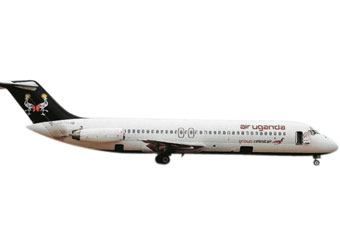
By Patrick Kagenda
Passenger sharing agreements allow it to fly EU destined travellers through Entebbe
Air Uganda seems determined to end the jinx that has afflicted Entebbe based national flag carriers since Uganda Airlines collapsed in 2001. Its successor, East African Airways, was launched in December 2002 but collapsed soon after, while Victoria International Airline closed barely two months into operation in March 2007.
The failure of Entebbe-based carriers is partly blamed on their frontal competition with regional giant Kenya Airways (KQ), which has been in service for over 30 years and flies to the largest number of East African regional routes including to Burundi, Rwanda, Dar-es-Salaam, Djibouti, and Entebbe. It also flies to 23 other destinations in Europe, South, North, and West Africa.
Air Uganda has adopted a more round-about approach by nibbling at the KQ dominance on the Entebbe-Nairobi route and focusing more on entering passenger and route sharing agreements with both regional and international carriers.
So when Lufthansa and Brussels announced in mid-July that they are offering code-shared flights on the Entebbe route and excitement swelled among travelers to Frankfurt and Brussels, Air Uganda was also smiling in the wings.
The collaboration is expected to boost Brussels which is a smaller and younger airline than Lufthansa.
Largely unnoticed by the passengers but intensely scrutinised by Uganda airlines business operators was the effect the code-share would have on the lucrative Entebbe-Nairobi route and other hinterland routes. Brussels already flies out of Entebbe four times a week.
This means Lufthansa passengers can fly directly to Entebbe via Brussels under a Lufthansa flight number and cut-off the Nairobi-Entebbe. The move, which is already operational, is significant because up to 5 % of the traffic on the Entebbe-Nairobi route comprise connection passengers.
More significant, however, will be the spillover effect on the Air Uganda cargo and passenger volumes.
Air Uganda registered a record 70,000 passengers in its first year of operation. With code sharing agreements in place, it could have a better year two. Its code-sharing agreements allow it to fly EU destined passengers and cargo from southern Sudan, Zanzibar, Daresalaam and Eastern DRC to Entebbe for the regular four weekly flights of Brussels Airlines out of Entebbe and for onward connections at the Jommo Kenyatta International Airport in Nairobi.
Air Uganda and Air Tanzania also have a code sharing agreement on the Entebbe-Daresalaam, Kilimanjaro, and Zanzibar routes which are serviced by both airlines. It also has agreements with Qatar Airways and Marsland Aviation of Sudan.
Brussels Airlines also has interline agreements with RwandaExpress which allow it to forward both passengers and cargo for onward travel to the European Union. Interline agreements allow airlines to handle passengers with multiple itineraries. Unlike code-sharing agreements, interlines do not allow an airline to number with its code a flight operated by another airline.
Commenting on the development, Jennifer Musiime, the marketing manager at Air Uganda said the interline sharing agreement with the Brussels Airlines has given them a share of the market and given their clients access to international connections unlike before when they had to carry two tickets.
As a result the Ugandan based Air Uganda will introduce a second flight on the Entebbe-Nairobi before the end of the year because of the growing passenger and cargo traffic. Other airlines that fly the Entebbe/Nairobi route include, Brussels Airlines, British Airways, Emirates, RwandaExpress, Egypt Air, and Ethiopian Airlines. Overall Air Uganda commands a 32 % market share on this route and hopes the interline agreements will increase its presence on the route.
At the Kenya Airways Uganda country office, the country manager, Daniel Maundo told The Independent that it is still performing well on the Entebbe “”Nairobi route.
“We are not worried by our partners like British Airways and KLM who have turned into competitors. It”™s competition like anywhere else. We have also been invaded by other operators like Emirates Airlines on our traditional routes not forgetting Ethiopian airlines who are our biggest competitor because they cover as much or more than what we are covering. It”™s tough for everyone in the industry”, he said.
The new competition comes at a bad time for KQ. Its staff went on strike on August 14 demanding higher wages and better working conditions. The strike, which paralysed KQ business at Jommo Kenyatta Airport, follows on a bad previous year and stifling competition on its routes from Nairobi to Entebbe from other new entrants like Fly540 Aviation, and Air Tanzania.
In spite of the introduction of the Antananarivo route onto the Kenya Airways network; its business marginally declined by 2.5% mainly due to the reduction of the Daresalaam operations now in joint venture with Precision Air.
Still, Captain Francis Babu, a pilot by profession says KQ will always protect its East African and African routes. “Kenya airways have had dominance of the industry routes both in Africa and Europe and dislodging it will be a Herculean task,” he says.
With a fleet of 23 aircraft, Kenya Airways serves more than 2.5 million passengers annually and flies to 43 destinations in 36 countries. Air Uganda meanwhile is much smaller with only 3 McDonnell Douglas MD-87 planes but as it heads to its second year anniversary this November, it is proving to be a force to reckon with very favourable operating factors.
 The Independent Uganda: You get the Truth we Pay the Price
The Independent Uganda: You get the Truth we Pay the Price


